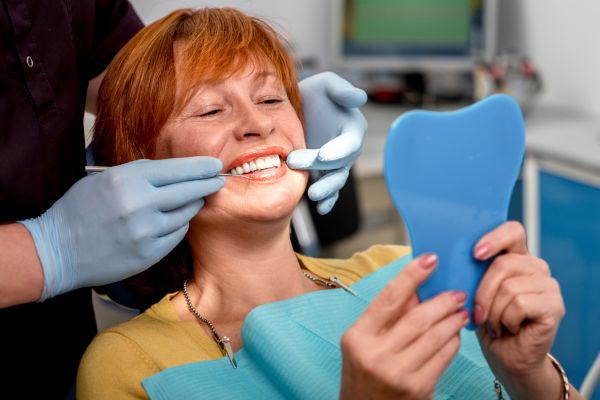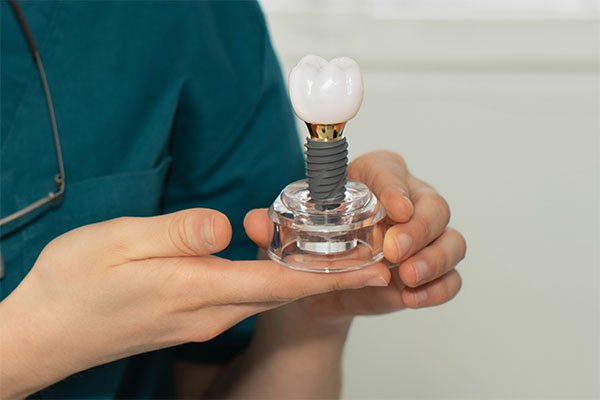Life After All-on-4®: How to Care for Your New Implants

All-on-4® provides a better alternative than removable dentures for people who have lost most of their teeth. The process combines dental implants and dentures to provide a solution for missing teeth that allows the patient to forget they have artificial teeth.
The All-on-4® process
Dentures have historically been the standard way to replace complete sets of teeth and they are affordable oral prosthetics. However, dentures come with a few major drawbacks that can leave some people wanting more.
For starters, dentures are prone to shifting when worn and that leads to sores forming on the soft tissues in the mouth. Dentures can also fall out when eating or speaking. Dentures also need to be regularly adjusted as the wearer's jaw deteriorates due to missing teeth.
All-on-4® solves the stability-related problems dentures are associated with by permanently attaching them to dental implants. Implants provide other benefits besides improved stability. These oral prosthetics are surgically inserted into the patient's jaw and they keep the tissues there stimulated, preventing the bone tissue loss that people who have missing teeth usually experience.
To be eligible for All-on-4®, the patient needs to be healthy enough for dental implants. They should not have health conditions that can make it harder for them to recover from oral surgery like immune system disorders. They should not be taking medication that can hinder recovery and they should be willing to take a break from drinking or using tobacco products.
Implants are embedded into the jaw so the patient needs to have enough bone tissues to hold them in place. If the patient lacks the bone density needed, bone grafts can be performed.
During the installation of All-on-4®, the dentist will insert four to six implants on each half of the patient's jaw. These implants are placed in locations with the thickest bone tissues for improved stability. A local anesthetic is administered prior to the installation of the implants.
Temporary dentures might be attached to the implants and the patient gets up to six months for their bone tissues to fuse with the implant. The process is called osseointegration. Once osseointegration is complete, a permanent set of customized dentures are attached to the implants.
Recovering after All-on-4®
The recovery process for All-on-4® can last up to six months. The implants will not be able to withstand heavy bite forces until osseointegration has taken place so patients will need to stick to a soft food diet. Chewy or sticky foods should be avoided while the implants are still fusing with the jaw.
Patients might experience some soreness and discomfort the first few days after getting implants installed, but that should go away shortly. Avoid brushing during this period, use salt water to clean the mouth instead. After that period, it is all about avoiding things that can lead to the implants becoming loose, as well as showing up for follow-up dental appointments.
Get started with All-on-4®
Contact our Brooklyn clinic if you are looking to replace your missing teeth. Our dentist will educate you about All-on-4® and other options.
Request an appointment here: http://www.gardendentalartsny.com or call Garden Dental Arts at (718) 416-6367 for an appointment in our Brooklyn office.
Check out what others are saying about our services on Yelp: Read our Yelp reviews.
Recent Posts
Part of preventative dental care is not only regularly maintaining your dental routine at home but also visiting your dentist twice a year. During this visit, they will look at the condition of your teeth and gums. Things they look out for are any sensitivities, bleeding, soft spots, or areas where bacteria are more likely…
The introduction of dental implants has provided a solution to tooth replacement that goes beyond mere function to address the core of personal well-being. Loss of teeth has an impact on a lot more than just dental health — it impacts chewing, talking ability, and confidence. This is where dental implants come into play as…
The most effective way to prevent tooth decay is with preventative dental care. Everyone wants to maintain a healthy white smile for a lifetime. Your smile is your first impression and a great way to show confidence. Keeping that smile can be very easy if you follow a few easy steps.Tooth decay causes gum disease,…
If you are looking to avoid having cavities, sensitive gums, or dental issues, your best bet is actively engaging in preventative dental care. Without regular dental cleanings, flossing, or rinses, you may be putting your dental hygiene at risk for things like gingivitis or even root canals. There are several healthy habits that you can…


